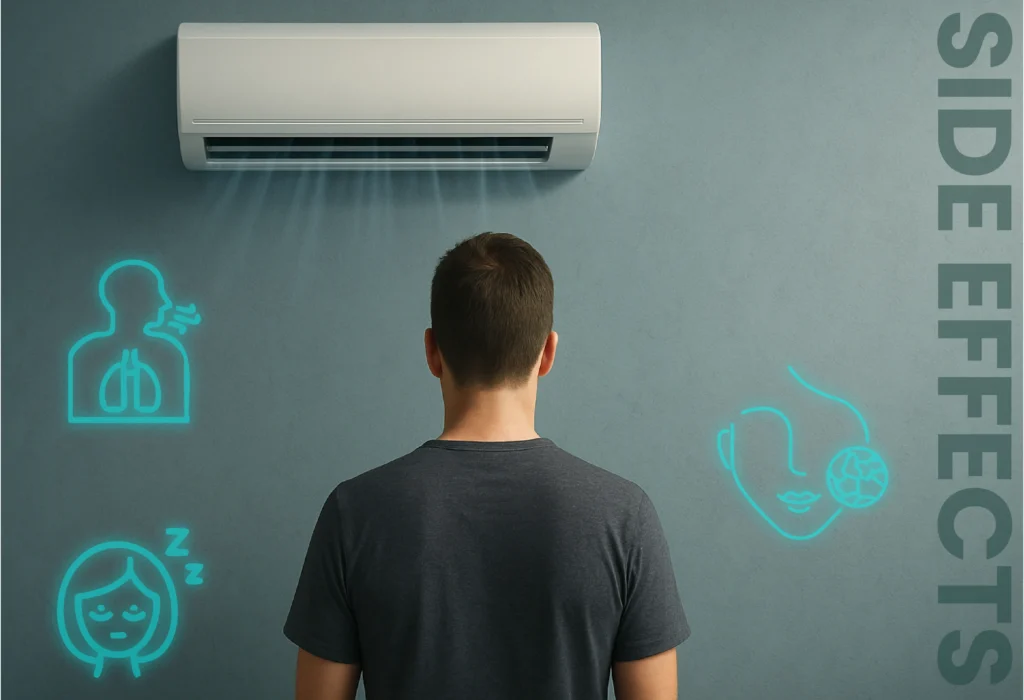Air conditioners (ACs) have become an essential part of modern living. From homes and offices to shopping malls and cars, they bring relief from the scorching heat, especially during the summer months. While ACs provide comfort, excessive or improper use can lead to various health problems. Many people are unaware of how constant exposure to artificially cooled environments affects their bodies.
Understanding the side effects of air conditioners is important so you can enjoy their benefits without compromising your well-being. In this blog, we’ll discuss the 10 most common AC side effects and share tips to reduce health risks.
1. Dry Skin and Irritation
Spending long hours in an air-conditioned environment can cause your skin to lose its natural moisture. This happens because AC units reduce indoor humidity levels, which leads to dry, flaky, and sometimes itchy skin. Over time, your skin’s natural protective barrier weakens, making it more sensitive to irritation and environmental factors. People with skin conditions like eczema or psoriasis may find their symptoms worsening due to prolonged exposure to cold, dry air. To combat this issue, it is essential to drink plenty of water, apply a good-quality moisturizer regularly, and consider using a humidifier to maintain a healthy level of moisture in the room.
2. Eye Dryness and Discomfort
Air conditioners can also impact your eyes by drying out the natural tear film that keeps them lubricated. This can result in redness, irritation, and a burning sensation, especially for people who wear contact lenses or spend long hours in front of digital screens. Constant exposure to cold air can also cause watery eyes and blurred vision, making it difficult to concentrate. If left unaddressed, this discomfort can lead to eye strain and headaches. To prevent these issues, try not to sit directly in front of the AC vent, use lubricating eye drops to keep your eyes moist, and take regular breaks to rest your eyes.
3. Respiratory Issues (Cold, Cough, Allergies)
One of the most concerning air conditioner health risks is its effect on the respiratory system. Dirty AC filters can accumulate dust, mold spores, and bacteria, which then circulate in the air you breathe. This can trigger allergies, frequent colds, coughing, and sinus congestion. People with respiratory conditions like asthma or bronchitis are particularly vulnerable, as exposure to these allergens can worsen their symptoms. Regular cleaning of AC filters and ducts is essential to ensure healthy air quality. Additionally, keeping the room slightly ventilated by occasionally opening windows can help bring in fresh air and reduce the concentration of indoor pollutants.
4. Headaches and Fatigue
If you often experience headaches, dizziness, or unexplained tiredness after staying in an air-conditioned environment, your AC may be to blame. Prolonged exposure to cold temperatures can reduce blood circulation and oxygen flow, leading to tension headaches and fatigue. Sudden shifts between outdoor heat and a chilly indoor space may also trigger migraines in some individuals. These effects are often worsened when AC temperatures are set too low. To prevent this, it’s best to keep your AC temperature between 24°C and 26°C and avoid extreme settings, especially if you frequently move between indoor and outdoor environments.
5. Joint or Muscle Stiffness
Cold temperatures cause muscles to contract, which can result in stiffness and discomfort in the joints. People who sit in one place for extended periods in an air-conditioned room are more likely to experience muscle pain, especially in the back, neck, and shoulders. Those with pre-existing conditions like arthritis may find their symptoms worsening in artificially cooled environments. To reduce this discomfort, avoid sitting directly under the AC vent and wear light layers of clothing to keep your body warm. Taking short breaks to stretch and move around can also help improve blood circulation and prevent stiffness.
6. Risk of Dehydration
Air conditioners remove moisture from the air as part of their cooling process, which can increase the risk of dehydration. When the air around you is dry, your body loses water more quickly through breathing and sweating, even if you don’t feel thirsty. Symptoms of dehydration include dry mouth, headaches, tiredness, and dizziness. Staying hydrated throughout the day is crucial to counteract this effect. Drinking plenty of water and including hydrating foods like cucumbers and watermelon in your diet can help maintain your body’s fluid balance.
7. Sleep Disturbances
Many people enjoy sleeping in a cool room, but setting your AC temperature too low can actually disrupt your natural sleep cycle. Extremely cold air can cause your body temperature to drop too much, making it difficult to fall asleep or stay asleep throughout the night. You might find yourself waking up feeling tired, restless, or shivering. For a healthy night’s sleep, keep your AC temperature at a comfortable level, ideally around 25°C. Using a timer to turn off the AC after a few hours can also help prevent overcooling while you sleep.
8. Worsening of Existing Health Issues
Individuals with pre-existing medical conditions such as asthma, sinusitis, or bronchitis may notice that their symptoms worsen when exposed to air conditioning for long periods. This is because cold, dry air can irritate sensitive airways and trigger breathing difficulties. Moreover, if AC systems are not properly maintained, they can circulate bacteria and viruses, increasing the chances of respiratory infections. Regular cleaning and servicing of your AC, along with the use of an air purifier, can significantly reduce these risks and promote healthier indoor air quality.
9. Immunity Reduction Due to Artificial Cooling
Constant reliance on ACs can weaken your body’s natural ability to adjust to temperature changes. When you spend most of your time in a cool, controlled environment, your immune system becomes less effective at dealing with outdoor heat or sudden temperature variations. This makes you more prone to common illnesses such as colds, coughs, and viral infections. To maintain your natural immunity, it’s important to step outside regularly and allow your body to experience different temperatures. This helps build resilience and strengthens your defense against seasonal illnesses.
10. Dependence on AC and Reduced Natural Heat Tolerance
Over time, heavy reliance on air conditioning can lead to a decreased tolerance for natural heat. When your body becomes accustomed to a consistently cool environment, even mild outdoor heat can feel unbearable. This dependency can be problematic during power outages or outdoor activities, as your body struggles to adapt to warmer temperatures. To prevent this, try gradually reducing your dependence on AC by using ceiling fans, improving ventilation, and spending more time outdoors. This will help your body adapt naturally and maintain its ability to handle heat more effectively.
Tips to Minimize the Side Effects of Air Conditioners
While ACs are a modern necessity, there are ways to reduce their negative effects on your health. Start by keeping your AC clean and well-maintained, as dirty filters are a major source of airborne allergens and bacteria. Maintain indoor humidity levels between 40% and 60% to prevent dryness. Avoid setting your AC temperature below 24°C, and take breaks from continuous AC use by spending some time in natural, open-air environments. Staying hydrated and using moisturizers can also help prevent skin and eye dryness. Regular servicing by a professional ensures optimal AC performance and cleaner, healthier air.
Conclusion
Air conditioners make our lives more comfortable, but improper use or lack of maintenance can have harmful effects on our health. From skin dryness and respiratory problems to weakened immunity and dependence on artificial cooling, the risks are significant but preventable. By using ACs wisely, maintaining them regularly, and taking simple steps like staying hydrated and balancing AC use with natural cooling methods, you can enjoy comfort without compromising your well-being.
If you decide not to go with an AC, air coolers are an excellent alternative. Products like Raj air Coolers provide a natural, eco-friendly, and energy-efficient way to keep your home cool while maintaining proper air circulation and humidity. Unlike ACs, coolers use fresh air and consume significantly less electricity, making them both cost-effective and environmentally friendly.

